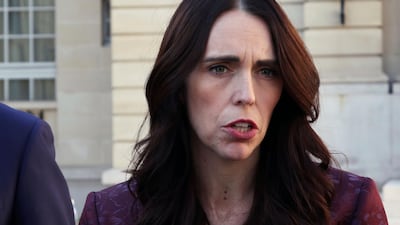New Zealand Prime Minster Jacinda Ardern and French President Emmanuel Macron will host world leaders and internet companies in Paris at a summit on Wednesday to discuss how to tackle online extremist content.
The summit will be held in response to the Christchurch mosque attacks in March, which killed 50 people and was streamed live on Facebook.
Original footage of the live stream was viewed about 4,000 times and 1.5 million copies of the video were taken down within the first 24 hours before being removed from the social media network.
The summit will focus on international efforts to stop social media being used to organise and promote terrorism.
Those attending are expected to sign a joint pledge, called the Christchurch Call to Action, to eliminate violent extremist content online.
Writing in The New York Times on Saturday, Ms Ardern said the "Christchurch Call" would be a voluntary framework that committed signatories to stop the uploading of extremist content.
Several nations are expected to sign the non-binding pledge, including Britain, Canada, Jordan, Senegal, Indonesia, Australia, Norway and Ireland.
But the US is not expected to sign because it has been reticent to regulate the internet for fears that it would harm free speech.
Facebook, Google and Microsoft are among the technology companies expected to sign the pledge.
Facebook announced Wednesday morning it would ban Facebook Live users who shared extremist content and seek to reinforce its own internal controls to stop the spread of offensive videos.
"Following the horrific recent terrorist attacks in New Zealand, we've been reviewing what more we can do to limit our services from being used to cause harm or spread hate," Facebook vice-president of integrity Guy Rosen said in a statement.
"That is a start, but there is a lot more work to do," said Ms Ardern, adding she would be chairing a meeting of tech giants
The event, which will take place two days after an inquiry into the Christchurch massacre began hearing evidence, will be co-chaired by Ms Ardern and Mr Macron.
Also expected to attend are Canadian Prime Minister Justin Trudeau, European Commission President Jean-Claude Juncker, British Prime Minister Theresa May, King Abdullah II of Jordan, Twitter chief executive Jack Dorsey and Facebook head of global affairs Nick Clegg.
Representatives from other internet companies including Twitter, Microsoft and Google will also be present.
Notable absentees are expected to include Facebook chief executive Mark Zuckerberg and US President Donald Trump.
Mrs May is expected to raise concerns about the threat posed by the Far Right and call for greater progress to develop solutions and collaboration between online platforms.
“The sickening attacks on Muslim worshippers in Christchurch shocked the world," she said.
"That 1.5 million copies of the video had to be removed by Facebook, and could still be found on YouTube for as long as eight hours after it was first posted, is a stark reminder that we need to do more to remove this content and stop it going online in the first place.
“While we have seen significant progress on this issue since the terror attacks on the UK in 2017, live-streaming of these attacks exposed gaps in our response and the need to keep pace with rapidly changing technological developments."
Mrs May will call on governments and internet companies to collaborate in preventing hateful comment from being shared.
She wants countries to take a shared, international approach to regulation, and follow the lead set by the UK’s Online Harms White Paper, which would impose a legal duty of care on internet companies.
In September 2017, Mrs May joined Mr Macron and then Italian prime minister Paolo Gentiloni in convening the first UN summit of government and industry to move further and faster in reducing the time it takes to remove terrorist content online and stop it being uploaded in the first place.
Last month the British government published its Online Harms White Paper, which stated that social media and tech companies would be legally required to protect their users or face tough punishment.

